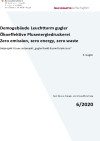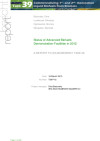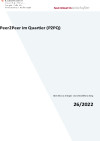Suchergebnisse für "Factsheet%3A Energietechnologien gestalten%2C die f%C3%BCr alle sinnvoll und nutzbar sind"
Demogebäude Leuchtturm gugler Ökoeffektive Plusenergiedruckerei Zero emission, zero energy, zero waste

Subprojekt 8 zum Leitprojekt „gugler!build & print triple zero“: Anhand des konkreten Gewerbegebäudes gugler mit 2140 m² Bestand und 3260 m² Neubaunutzflächen wurde ein Konzept für ein 100% kreislauffähiges ökoeffektives Gebäude erstellt.
Schriftenreihe
6/2020
E. Gugler
Herausgeber: BMK
Deutsch, 39 Seiten
Downloads zur Publikation
Status of Advanced Biofuels Demonstration Facilities in 2012

Der Bericht gibt einen Überblick über den Stand der Technik der Umwandlungstechnologien von Biomasse zu fortgeschrittenen Biotreibstoffen und stellt eine Ergänzung zu der vorhandenen Demonstrationsanlagen-Datenbank dar.
Herausgeber: IEA Bioenergy Task 39, BIOENERGY 2020+
Englisch, 209 Seiten
Downloads zur Publikation
IEA SHC Task 59/EBC Annex 76: Integration of Energy-Efficient Ventilation Systems in Historic Buildings—Review and Proposal of a Systematic Intervention Approach (2021)

Integration energieeffizienter Lüftungsanlagen in historischen Gebäuden unter Berücksichtigung einer systematischen Bewertung anhand der EN 16883:2017
Rieser A, Pfluger R, Troi A, Herrera-Avellanosa D, Thomsen KE, Rose J, Arsan ZD, Akkurt GG, Kopeinig G, Guyot G, Chung D.
Herausgeber: Sustainability. 2021
Englisch
BIOENERGIE-Kraft Wärme Kälte Kopplung-VERSORGUNG
Erarbeitung von Modellen zur Entwicklung von optimierten Energieversorgungs-Konzepten für Bio-Kraft-Wärme-Kälte-Kopplungssysteme, zur Erhöhung der Auslastung von Energieversorgungssystemen im Sommer um eine ganzjährige CO2-neutrale Energieversorgung zu ermöglichen.
Projektpräsentation: IMMO-RATE - Leitfaden für das Immobilienrating nachhaltiger Wohnbauten (Bregenz)
13. Jul 2006
Rhomberg Bau GmbH, Mariahilfstraße 29
6900 Bregenz, AT
Der Leitfaden "Immo-Rate - Bausteine und Tools für das Immobilienrating von nachhaltigen Wohnbauten" integriert zentrale Ergebnisse der Programmlinie "Haus der Zukunft" in das professionelle Immobilienrating von Finanzinstitutionen.
Projektpräsentation: IMMO-RATE - Leitfaden für das Immobilienrating nachhaltiger Wohnbauten (Wien)
22. Jun 2006
Erste Bank, Beatrixgasse 27, 6. Stock
1030 Wien, AT
Der Leitfaden "Immo-Rate - Bausteine und Tools für das Immobilienrating von nachhaltigen Wohnbauten" integriert zentrale Ergebnisse der Programmlinie "Haus der Zukunft" in das professionelle Immobilienrating von Finanzinstitutionen.
P2PQ - Peer2Peer im Quartier

Das Projekt Peer2Peer im Quartier befasst sich mit der konkreten Umsetzung von Anwendungen zu Photovoltaik-Eigenverbrauchsoptimierung sowie Peer-to-Peer-Beziehungen auf Basis der Blockchain-Technologie in Quartieren und deren Validierung im Echtbetrieb.
Schriftenreihe
26/2022
Herausgeber: BMK
Deutsch, 43 Seiten
Downloads zur Publikation
Aktueller Newsletter - IEA Bioenergy Task 33 "Thermal Gasification of Biomass"
Der erste Newsletter des IEA Bioenergy Task 33 informiert über Aktivitäten innerhalb des Tasks, Hintergrundinformationen zum Thema Biomassevergasung sowie über neueste Entwicklungen in den Mitgliedsländern.
IEA Forschungskooperation - Ausschreibung 2024
Finanziert werden österreichische Beteiligungen an den Tasks und Annexen der IEA Technologieprogramme. Angebote zu den thematischen Schwerpunkten können bis zum 17. Juli 2024 eingereicht werden.
Ausschreibung zum ÖGUT-Umweltpreis geöffnet!
Das BMIMI unterstützt drei Kategorien: "Klimaneutrale Stadt", "Mit Forschung & Innovation zur Kreislaufwirtschaft" und "Frauen in der Umwelttechnik". Das Preisgeld beträgt insgesamt EUR 40.000, Einreichschluss ist der 15. September 2025.
GreenPlusSchool@urban - Highly efficient facade and roof greening in combination with PV; optimal solution for energy efficiency in overall environmental consideration
In this project, different building-greening systems and plant/substrate types, combined with various PV modules, had been examined on a Viennese school. The influence on the hygrothermal behaviour of the building, energy-saving potential, humidity, shading, noise reduction, water retention and heat island effect are being scientifically explained. The students of the school will also be involved.
IEA DHC Annex TS8: Experimental investigations of DHC systems
The project aims at promoting and improving the use of experimental studies for the transformation, decarbonization and flexibilization of new and existing district heating and cooling (DHC) systems. A strong focus will be on the integration of digital technologies, both in terms of application (e.g., IoT and cloud solutions, digital twins, machine learning) and experimental implementation (e.g., hardware-in-the-loop, data spaces).
Themenworkshop "Industrielle Umsetzung"
Am nächsten Themenworkshop am Vormittag des 21. September 2011 in der aws werden rechtliche und investive Möglichkeiten bei der industriellen Umsetzung von Technologien sowie erfolgreiche Beispiele aus der Praxis vorgestellt.
Net Zero Fahrplan: Ein globaler Wegweiser, um das 1,5°C-Ziel zu erreichen
Auf der Grundlage der neuesten Daten zu Technologien, Märkten und der aktuellen Politik wird in diesem Bericht eine aktualisierte Version des Szenarios "Netto-Null-Emissionen bis 2050" (NZE) vorgestellt.
Netzqualität bei dezentraler Stromeinspeisung auf Basis erneuerbarer Energieträger
Durch den Einsatz neuer Technologien integriert in dezentrale Stromerzeugungsanlagen basierend auf erneuerbaren Energieträgern soll demonstriert werden, wie diese aktiv zur Verbesserung der Versorgungsqualität in Netzen beitragen können, um damit den weiteren Ausbau von dezentraler Erzeugung zu unterstützen.
Plusenergieverbund Reininghaus Süd
ECR Energy City Graz - Subprojekt 3: Demobauvorhaben +ERS Plusenergieverbund Reininghaus Süd
IEA SHC Task 59: A new decision guidance tool for the adoption of energy retrofit solutions in historic buildings (2021)

Eine neue Entscheidungshilfe für den Einsatz von energetischen Sanierungslösungen in historischen Gebäuden.
Alexander Rieser, Eleonora Leonardi, Franziska Haas, Rainer Pfluger
Herausgeber: SBE 21 Heritage Konferenz Bozen
Englisch, 8 Seiten
1000 Passivhäuser in Österreich 3. Dokumentationsperiode 2006 - 2008
3. Dokumentationsperiode des Gemeinschaftsprojektes der IG Passivhaus Österreich zur detaillierten Netzwerkdokumentation eines repräsentativen Querschnitts aller Passivhaus-Objekte in Österreich.
Treffen der Vertreter der Tasks des Technology Collaboration Programme (TCP) Bioenergy der Internationalen Energieagentur (IEA)
Am 12.12.2016 fand im Bundesministerium für Verkehr Innovation und Technologie (BMVIT) ein erneutes Treffen der Vertreter der Tasks des Technology Collaboration Programme (TCP) Bioenergy der Internationalen Energieagentur (IEA) statt.
SQUARE - A System for Quality Assurance when Retrofitting Existing Buildings to Energy Efficient Buildings
The project aims to promote a flexible quality assurance management for the retrofitting process. It leads to high quality renovations of residential multifamily buildings regarding energy improvement and improvement of indoor environment.
